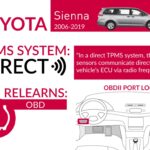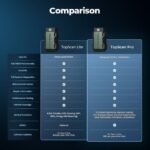The evolution of automotive technology has brought significant advancements, particularly in vehicle diagnostics. Early vehicles utilized the On-Board Diagnostics 1 (OBD1) system, while modern cars are equipped with the more sophisticated OBD2. For car enthusiasts and those looking to enhance their vehicle’s diagnostic capabilities, the question often arises: is it possible or beneficial to perform an Obd1 To Obd2 conversion?
Understanding the differences between OBD1 and OBD2 is crucial. OBD1, used in vehicles typically manufactured before the mid-1990s, lacked standardization. Diagnostic information retrieval varied significantly between manufacturers, often requiring specialized tools and procedures. OBD2, mandated in the United States in 1996, introduced a standardized connector, diagnostic trouble codes (DTCs), and enhanced emissions monitoring. This standardization made vehicle diagnostics more accessible and efficient.
Alt text: OBD2 port in a vehicle, highlighting its standardized trapezoidal shape.
Converting from OBD1 to OBD2 is technically feasible, primarily involving replacing the OBD1 components with OBD2 compliant parts. This process generally requires a conversion harness to adapt the wiring, and potentially an OBD2 compatible Engine Control Unit (ECU). However, it’s not always a straightforward plug-and-play solution. Compatibility issues can arise depending on the vehicle’s make, model, and year.
Alt text: OBD1 to OBD2 conversion harness, showcasing the connectors for adapting older systems to newer standards.
While the benefits of OBD2, such as standardized diagnostics and broader scanner compatibility, are appealing, the complexity and cost of conversion should be carefully considered. Unless there are specific needs driving the conversion, such as participating in events requiring OBD2 compliance, or if the original OBD1 system is failing and OBD2 components are more readily available, it may not be a necessary upgrade. Maintaining the original system or seeking repair solutions within the OBD1 framework might be more practical and cost-effective for older vehicles. Consulting with a qualified mechanic experienced in automotive electronics is advisable to determine the best course of action for your specific situation.

